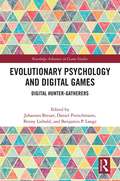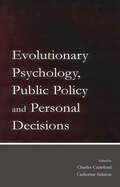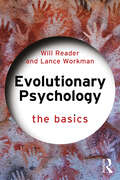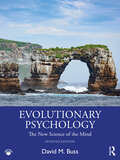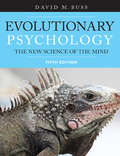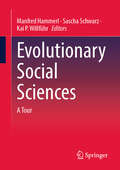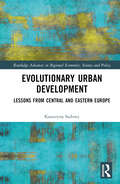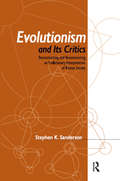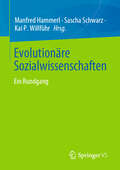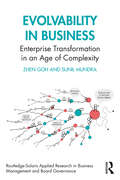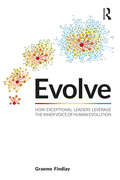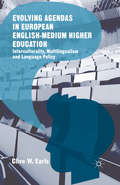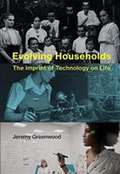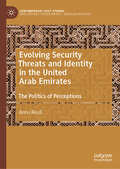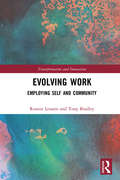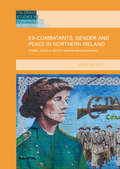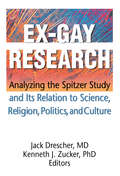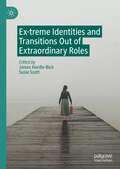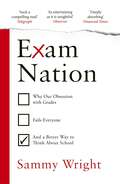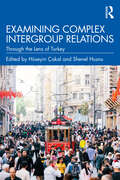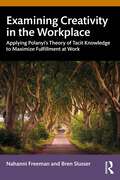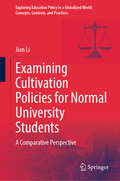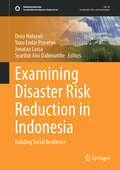- Table View
- List View
Evolutionary Psychology and Digital Games: Digital Hunter-Gatherers (Routledge Advances in Game Studies)
by Johannes Breuer Daniel Pietschmann Benny Liebold Benjamin P. LangeEvolutionary Psychology and Digital Games: Digital Hunter-Gatherers is the first edited volume that systematically applies evolutionary psychology to the study of the use and effects of digital games. The book is divided into four parts: Theories and Methods Emotion and Morality Social Interaction Learning and Motivation These topics reflect the main areas of digital games research as well as some of the basic categories of psychological research. The book is meant as a resource for researchers and graduate students in psychology, anthropology, media studies and communication as well as video game designers who are interested in learning more about the evolutionary roots of player behaviors and experiences.
Evolutionary Psychology, Public Policy and Personal Decisions
by Charles Crawford Catherine SalmonDuring the last 15 years, human sociobiology has metamorphosed into evolutionary psychology. It is concerned with the social problems and stresses hominid and primate ancestors encountered, the psychological mechanisms natural selection shaped to deal with these stresses, and the way those ancient mechanisms work now. Evolutionary psychologists are making great progress in expanding the understanding of human nature, however, this knowledge has had little impact on policymakers and legislators. Supreme Court justices and managers seldom consult evolutionary psychologists to help with their deliberations. When faced with private decisions few individuals ask themselves how a Darwinian perspective might help them. This volume's aim is to start the process of using theory and findings of evolutionary psychology to help make the world a better place to live. This book takes evolutionary psychology explicitly into applied areas in a way no other book has. It includes a reasonable scope of applications from pornography to psychopaths and from morality to sex differences in the workplace. An applications section provides concrete ideas for dealing with social and policy issues, including chapters on women in the workplace, rape, and child support. Providing good coverage of basic issues and theory of the field, this book gives lay people and law/policymakers appropriate background to fully understand the applications chapters. Part II provides information on basic psychological mechanisms for group living--including chapters on emotions, reciprocity and legal reasoning, and self deception--that impact on how well public policy and law function. The material in the first two sections provide an intellectual basis for the chapters in the third part of the book which deals with the application of evolutionary psychology to a variety of substantive areas related to public policy and personal decisions. A political scientist concludes the book with a commentary on evolutionary psychology and public policy. The book is designed to serve as a stand-alone text in evolutionary psychology and public policy that can be used in a variety of disciplines, such as psychology, social work, law and psychology, and public policy.
Evolutionary Psychology: The Basics (The Basics)
by Lance Workman Will ReaderEvolutionary Psychology: The Basics is a jargon-free and accessible introduction to evolutionary psychology, which examines behaviour, thoughts, and emotions in relation to evolutionary theory. Reader and Workman outline how evolutionary thinking can enhance the core areas of psychology: social, developmental, biological, cognitive, and individual differences/abnormal psychology. Covering topics such as genetics and natural selection, mate choice, culture, morality, mental health, and childhood, among others, the book integrates psychology into the biological sciences and explains the different approaches in the field by evaluating current and past evolutionary research and theory. Key studies and theories are explored in an accessible way, with the work of key evolutionary and behavioural scientists from Darwin to Dawkins examined and explained.Including a glossary and further reading, this is the essential introduction to evolutionary psychology for students of psychology and related areas, and academics and researchers, as well as anyone interested in learning more about this fascinating field.
Evolutionary Psychology: The New Science of the Mind
by David M. BussWhere did we come from?What is our connection with other life forms?What are the mechanisms of mind that define what it means to be a human being?In the seventh edition of this revolutionary textbook, David M. Buss examines human behavior from an evolutionary perspective, providing students with the conceptual tools needed to study evolutionary psychology and apply them to empirical research on the human mind. Content is organised by topic, beginning with the challenges of survival, mating, parenting, and kinship; progressing to challenges of group living, including cooperation, aggression, sexual conflict and status, prestige, and social hierarchies.Key features of this edition include: Updated and enhanced material based on an explosion of new theories and research, including dozens of new references Expanded coverage of topics including socioecology, behavior, emotions, and gender Exploration of evolutionary mismatches in several domains such as survival, kinship, and mating, including a discussion of internet dating With a wealth of student-friendly pedagogy including critical thinking questions and case study boxes supporting the application of evolutionary psychology to real-world situations, this is an invaluable resource for undergraduates studying psychology, biology, and anthropology. The textbook is also supported by a range of instructor resources, including PowerPoint slides, a test bank, and an instructor’s manual, to help students achieve their higher learning goals.
Evolutionary Psychology: The New Science of the Mind (Mysearchlab Series 15% Off Ser.)
by David M BussWhere did we come from? What is our connection with other life forms? What are the mechanisms of mind that define what it means to be a human being? Evolutionary psychology is a revolutionary new science, a true synthesis of modern principles of psychology and evolutionary biology. Since the publication of the award-winning first edition of Evolutionary Psychology, there has been an explosion of research within the field. In this book, David M. Buss examines human behavior from an evolutionary perspective, providing students with the conceptual tools needed to study evolutionary psychology and apply them to empirical research on the human mind. This edition contains expanded coverage of cultural evolution, with a new section on culture–gene co-evolution, additional studies discussing interbreeding between modern humans and Neanderthals, expanded discussions of evolutionary hypotheses that have been empirically disconfirmed, and much more! Evolutionary Psychology features a wealth of student-friendly pedagogy including critical-thinking questions and case study boxes designed to show how to apply evolutionary psychology to real-life situations. It is also accompanied by a thoroughly updated companion website featuring PowerPoints for each chapter, test bank questions, and links to web resources and videos. Evolutionary Psychology is an invaluable resource for undergraduates studying psychology, biology and anthropology.
Evolutionary Psychology: The New Science of the Mind, Fifth Edition (Mysearchlab Series 15% Off Ser.)
by David BussThis book examines human psychology and behavior through the lens of modern evolutionary psychology. Evolutionary Psychology: The Ne w Science of the Mind, 5/e provides students with the conceptual tools of evolutionary psychology, and applies them to empirical research on the human mind. Content topics are logically arrayed, starting with challenges of survival, mating, parenting, and kinship; and then progressing to challenges of group living, including cooperation, aggression, sexual conflict, and status, prestige, and social hierarchies. Students gain a deep understanding of applying evolutionary psychology to their own lives and all the people they interact with.
Evolutionary Social Sciences: A Tour
by Kai P. Willführ Manfred Hammerl Sascha SchwarzIn many social science disciplines, the potential of Darwinian evolution theory has now been recognized, and this reception has often led to the emergence of new fields of research. For example, Evolutionary Psychology, Evolutionary Sociology, and Evolutionary Demography have established themselves as independent disciplines and can be summarized as Evolutionary Social Sciences. Selected concepts and application areas of the Evolutionary Social Sciences are addressed in this book. It invites readers on an interdisciplinary tour that spans disciplines such as psychology, sociology, family studies, behavioral genetics, demography, history, game theory, and archaeology. The book is divided into two parts. The first part includes contributions that provide an accessible introduction to the research fields and central concepts of the Evolutionary Social Sciences. The second part contains contributions that address specific questions from an evolutionary perspective. The target audience for the book includes social scientists and students who wish to engage with the evolutionary perspective in the social sciences.
Evolutionary Social Theory and Political Economy: Philosophy and Applications (Economics as Social Theory)
by Clifford S. Poirot Jr.Evolutionary Social Theory and Political Economy traces the origins, extension, marginalization and revival of evolutionary approaches to social theory from the Enlightenment through the beginning of the 21st century. It demonstrates how changes in understandings of social evolution corresponded to changes in definitions of Political Economy and how both reflected changes in the Philosophy of Science. This book is written for students and researchers alike in all the social sciences. Economists will benefit from understanding how ideas about evolution in Economics corresponded to ideas about evolution in other social sciences, and Social Scientists outside of Economics will benefit from understanding how Economics has related to their discipline.
Evolutionary Urban Development: Lessons from Central and Eastern Europe (Routledge Advances in Regional Economics, Science and Policy)
by Katarzyna SadowyDrawing on a range of disciplinary approaches, this monograph explores the drivers of urban development. Through an evolutionary lens, cities are shown to find a development path amidst an ever-changing landscape, sometimes facing extreme externalities such as wars and economic crises. Key themes covered include urban growth, decentralization, path dependence, institutional change, governance, entrepreneurship and culture. Detailed case studies of the history-rich metropolises of Berlin, Budapest and Warsaw allow the author to examine the adaptive abilities of cities in flux, and draw conclusions with broader international relevance. This monograph will be valuable reading for advanced students and researchers in urban economics, evolutionary economics, institutional economics and Central European studies.
Evolutionism and Its Critics: Deconstructing and Reconstructing an Evolutionary Interpretation of Human Society
by Stephen K. SandersonEvolutionism and Its Critics is a critical history of evolutionary theories in the social sciences and a defense of them against their many critics. Sanderson deconstructs not only the wide array of social evolutionary theories, but the criticisms of the antievolutionists. Deconstructing evolutionary theories means laying bare their fundamental epistemological, methodological, conceptual, and theoretical assumptions and principles. Deconstructing antievolutionism means showing just where and how the critics have, for the most part, gone wrong. But Evolutionism and Its Critics aims to reconstruct as well as deconstruct and does this by building on the shoulders of past giants of evolutionary theorizing a comprehensive evolutionary interpretation of human society based on abundant scientific and historical evidence.
Evolutionäre Sozialwissenschaften: Ein Rundgang
by Kai P. Willführ Manfred Hammerl Sascha SchwarzIn vielen sozialwissenschaftlichen Disziplinen wurde mittlerweile das Potential der Darwinischen Evolutionstheorie erkannt und nicht selten hat diese Rezeption auch zur Herausbildung neuer Forschungsfelder geführt. So haben sich beispielsweise die Evolutionäre Psychologie, Evolutionäre Soziologie oder Evolutionäre Demografie als eigenständige Disziplinen etabliert und können als Evolutionäre Sozialwissenschaften zusammengefasst werden. Ausgewählte Konzepte und Anwendungsfelder der Evolutionären Sozialwissenschaften werden im vorliegenden Buch behandelt. Es wird dabei zu einem interdisziplinären Rundgang eingeladen, der unter anderem über die Disziplinen Psychologie, Soziologie, Familienwissenschaft, Verhaltensgenetik, Demografie, Geschichtswissenschaft, Spieltheorie bis hin zur Archäologie führt.Das Buch gliedert sich in zwei Teile. Im ersten Teil finden sich Beiträge, welche allgemein verständlich in die Forschungsfelder und zentralen Konzepte der Evolutionären Sozialwissenschaften einführen. Der zweite Teil beinhaltet Beiträge, die sich aus einer evolutionären Betrachtungsweise heraus einzelnen Fragestellungen widmen.Zielgruppe des Buches sind Sozialwissenschaftlerinnen und Sozialwissenschaftler sowie Studierende, welche sich mit der evolutionären Perspektive in den Sozialwissenschaften auseinandersetzen möchten.
Evolvability in Business: Enterprise Transformation in an Age of Complexity (Routledge-Solaris Applied Research in Business Management and Board Governance)
by Sunil Mundra Zhen GohThrough the unique combination of evolutionary biology and management theory applied to business cases, and keeping in mind that organisations are fundamentally human systems, Goh and Mundra propose organisational evolvability as a new frame to guide enterprise transformation and change.Some of the topics covered in the book include: Understanding the differences between Complicated and Complex; Moving from Planned Change to Emergent Change; Applying principles of evolution to enterprise evolvability, and how to operationalise it using a Sense-Adapt-respond loop; Identifying and addressing Sensemaking gaps; including different approaches to scaling and repaying organisational debt; Measuring outcomes under conditions of complexity. This book proposes that transformation is not a one-and- done event but a continuous process of adapting to a dynamic and unpredictable environment. The goal of transformation should be to enhance organisational evolvability – the capacity of a system for adaptive evolution. This book encourages leaders and practitioners to view organisations as open and complex adaptive systems and provides frameworks that help them to manage transformations with adaptive grace.A perfect volume for managers, executives and leaders at companies of all sizes. It will also be of interest to instructors in executive education, as well as scholars in organisational studies and business management. This book is for anyone seeking to create a culture of adaptability and change.
Evolve: How exceptional leaders leverage the inner voice of human evolution
by Graeme FindlayLeaders work hard to develop strong leadership capabilities in today’s modern organizations, for the benefit of their teams and for their own careers. But, sometimes conventional leadership theory fails to explain why our efforts fail to make an impact, and arguably are becoming less and less successful. Why would this be? The answer lies in our evolutionary history. Leadership is integral to our success and evolution as a species, as larger better functioning groups out-survived fragmented groups that did not benefit from strong leadership. Leader-follower relationships are, therefore, deeply ingrained in our brains, our instincts and our behaviour. But, our modern world, with its technology, connectedness and complexity, has evolved much faster than our brains – and our leader-follower behaviour has not caught up. Evolve charts the fascinating development of our evolutionary history to provide a profound understanding of human behaviour around leadership. It also establishes a framework for the modes of leadership that shape the world today. Through case studies and real-world examples, you will gain powerful insights into the nature of leadership now. More importantly, these insights inform the actions you can take in your own life to enable you to become a more aware, mindful, impactful, and successful leader.
Evolving Agendas in European English-Medium Higher Education: Interculturality, Multilingualism and Language Policy
by Clive W. EarlsEnglish medium-of-instruction (EMI) is transforming modern-day universities across the globe, creating increasingly complex linguistic and intercultural realities which lecturers, students and decision-makers must negotiate. Teaching subject matter at higher-education level through the medium of English, in countries where English is neither an official nor national language (e.g. the Netherlands, Germany), is a highly complex phenomenon fraught with challenges and benefits. EMI programmes are capable of transforming domestic degree programmes into platforms of intercultural teaching and learning by infusing them with greater numbers of international faculty and students. Equally however, EMI programmes pose a socio-linguistic, -cultural and -economic challenge by institutionalising English at higher-education level within a country and displacing somewhat national and minority languages. This book, the first of its kind, provides an up-to-date and empirically-informed exploration of these salient themes in Europe, based on significant empirical data gathered and analysed on the German EMI context.
Evolving Households: The Imprint Of Technology On Life
by Jeremy GreenwoodIn Evolving Households, Jeremy Greenwood argues that technological progress has had as significant an effect on households as it had on industry. Taking a macroeconomic perspective, Greenwood develops simple economic models to study such phenomena as the rise in married female labor force participation, changes in fertility rates, the decline in marriage, and increased longevity. These trends represent a dramatic transformation in everyday life, and they were made possible by advancements in technology. Greenwood also addresses how technological progress can cause social change. <p><p> Greenwood shows, for example, how electricity and labor-saving appliances freed women from full-time household drudgery and enabled them to enter the labor market. He explains that fertility dropped when higher wages increased the opportunity cost of having children; he attributes the post–World War II baby boom to a combination of labor-saving household technology and advances in obstetrics and pediatrics. Marriage rates declined when single households became more economically feasible; people could be more discriminating in their choice of a mate. Technological progress also affects social and cultural norms. Innovation in contraception ushered in a sexual revolution. Labor-saving technological progress at home, together with mechanization in industry that led to an increase in the value of brain relative to brawn for jobs, fostered the advancement of women's rights in the workplace. Finally, Greenwood attributes increased longevity to advances in medical technology and rising living standards, and he examines healthcare spending, the development of new drugs, and the growing portion of life now spent in retirement.
Evolving Security Threats and Identity in the United Arab Emirates: The Politics of Perceptions (Contemporary Gulf Studies)
by Anna ReußThis book examines and conceptualises the determinants of threat perceptions in the United Arab Emirates (UAE) and contributes to a better understanding of how a nation&’s self-conception shapes its perceptions of (in)security and emphasises the relevance of these dynamics for policymaking. It combines the societal approach of the English School of IR with securitization theory to offer a novel framework for analyzing threat perceptions. This book is relevant to students of Middle Eastern studies, gulf studies, international relations, and scholars who are interested in theoretical perspectives.
Evolving Work: Employing Self and Community (Transformation and Innovation)
by Ronnie Lessem Tony BradleyThe idea of Self and the authenticity of particular identities have been rapidly dissolving in the acids of post-modern globalising capitalism. The hegemony of patterns of work, wage-labor and the operation of labour markets in the American West (and European North) has ridden rough-shod over distinctive ways of enabling communities to flourish in many parts of the Southern and Eastern worlds (Global South). But, this is not inevitable. Indeed, as this book indicates, there are many practical examples across the globe – that connect with some of the most significant theoretical challenges to the operation of dehumanising work – which reveal that a profound reversal is taking place. As such, the core theme of this book is to show that a movement is occurring whereby self-employment can be transformed into communal work that employs the Self in ways that release the authentic vocations of people, individually and collectively. The approach taken in these chapters traverses the globe, utilising the original ‘integral worlds’ model that will be familiar to students of the Trans4M/Routledge Transformation and Innovation series, developed over more than a decade. Such a standpoint points the way to the release of particular social and economic cultures in each of what we term the four "realities" or "worldviews" of South, East, North and Western worlds. In this book we use the methodology of GENEalogy – identifying the realms associated with each world – to show how the rhythms, that is Grounding, Emergence, Navigation and Effect, of each is leading to greater economic, social and spiritual freedom for individuals, organisations, communities and, indeed, entire societies.
Ex-Combatants, Gender and Peace in Northern Ireland
by Azrini WahidinThis book explores the contours of women's involvement in the Irish Republican Army, political protest and the prison experience in Northern Ireland. Through the voices of female and male combatants, it demonstrates that women remained marginal in the examination of imprisonment during the Conflict and in the negotiated peace process. However, the book shows that women performed a number of roles in war and peace that placed constructions of femininity in dissent. Azrini Wahidin argues that the role of the female combatant is not given but ambiguous. She indicates that a tension exists between different conceptualisations of societal security, where female combatants both fought against societal insecurity posed by the state and contributed to internal societal dissonance within their ethno-national groups. This book tackles the lacunae that has created a disturbing silence and an absence of a comprehensive understanding of women combatants, which includes knowledge of their motivations, roles and experiences. It will be of particular interest to scholars of criminology, politics and peace studies.
Ex-Gay Research: Analyzing the Spitzer Study and Its Relation to Science, Religion, Politics, and Culture
by Jack Drescher Kenneth J ZuckerDefenders and critics of the controversial Spitzer study analyze its methodologies and findingsIn 2001, Robert L. Spitzer, MD, presented his study on sexual conversion therapy with its controversial findings that some homosexuals can change their sexual orientation. The resulting media sensation and political firestorm enraged the study&’s critics and emboldened its supporters. Ex-Gay Research: Analyzing the Spitzer Study and Its Relation to Science, Religion, Politics, and Culture presents leading experts examining Spitzer&’s research methodology and findings to discern whether the study itself deserves deeper consideration or outright dismissal. Every facet of the study is reviewed to discuss the positive or negative aspects of the results, its significance in political and social terms, and the implications for the future. Dr. Spitzer himself was an instrumental figure in the American Psychiatric Association's decision in 1973 to remove homosexuality as a mental illness listing from the Diagnostic and Statistical Manual-III. His later study that states that in some individuals, homosexuality may be more fluid than previously thought stirred controversy in the psychiatric community and society at large. His study is presented here to allow the reader to evaluate and consider it for themselves. Leading experts then voice their own pro or con views on the methodology and findings. Ex-Gay Research: Analyzing the Spitzer Study and Its Relation to Science, Religion, Politics, and Culture fearlessly illustrates the sometimes fuzzy boundary between science and politics, courageously spotlighting the culture wars now dividing our society.Ex-Gay Research: Analyzing the Spitzer Study and Its Relation to Science, Religion, Politics, and Culture discusses: the ex-gay movement the nature of scientific inquiry the relationship between science and politics the results of sexual conversion therapies gay and lesbian rightsEx-Gay Research: Analyzing the Spitzer Study and Its Relation to Science, Religion, Politics, and Culture is essential reading for sex researchers, mental health professionals, pastoral counselors, political activists, and any person asking if one can truly "change" his or her homosexuality.
Ex-treme Identities and Transitions Out of Extraordinary Roles
by Susie Scott James Hardie-BickThis book focuses on the experience of leaving unusual or extreme situations: from military careers to religious communities, subcultures, criminal groups and political leadership. It explores how people become disillusioned with and disengaged from these social worlds, challenging their sense of self-identity and cultural belonging. Each chapter considers how participants negotiate the process of ‘role exit’ and adjust to their new identity back in the everyday world. Drawing on symbolic interactionist and existentialist theories, the authors discuss how ex-members dismantle and rebuild their lives in a search for personal meaning.
Exam Nation: Why Our Obsession with Grades Fails Everyone – and a Better Way to Think About School
by Sammy WrightSchool should equip children for adulthood. In reality, it means one thing: exams. Exam Nation sets out a better way – and, crucially, shows us how we might get there.'An essential read - as entertaining as it is insightful - for anyone who cares about the way we treat young people ... Brilliant’ OBSERVEREducationalist and Head of School Sammy Wright argues that grades, rankings and Ofsted reports all miss the point of school, and together they are undermining our whole approach to education. Rather than sorting pupils into winners and losers, we need to think differently about what our schools are actually for – to see them as communities not factories – if we are to give all young people the opportunities and future they deserve.‘Such a compelling read’ TELEGRAPH‘Deeply absorbing ... Wright deserves the highest marks’ FINANCIAL TIMES‘Extraordinary … The book education has been waiting for’ LAURA MCINERNEY‘Persuasive … He is clearly a superb teacher’ SAM FREEDMAN, LITERARY REVIEW
Examining Complex Intergroup Relations: Through the Lens of Turkey
by Hüseyin Çakal Shenel HusnuThis ground-breaking volume presents a unique contribution to the development of social and political psychology both in Turkey and globally, providing a complex analysis of intergroup relations in the diverse Turkish context. Turkey is home to a huge variety of social, ethnic and religious groups and hosts the largest number of refugees in the world. This diversity creates a unique opportunity to understand how powerful forces of ethnicity, migration and political ideology shape intergroup processes and intergroup relations. Bringing together novel research findings, the international collection of authors explore everything from disability, age and gender, Kurdish and Armenian relations as "traditional minorities", the recent emergence of a "new minority" of Syrian refugees and Turkey’s complex political history. The theories and paradigms considered in the book – social identity, intergroup contact, integrated threat, social representations – are leading approaches in social and political psychology, but the research presented tests these approaches in the context of a very diverse and dynamic non-WEIRD (Western, Educated, Industrialized, Rich and Democratic) society, with the goal of contributing toward the development of a more intercultural and democratic social and political psychology. Bringing together cutting-edge research and providing important insights into the psychological underpinnings of a singular societal situation from a variety of perspectives, this book is essential reading for students studying the psychology, politics and social science of intergroup relations, as well as practitioners interested in conflict resolution.
Examining Creativity in the Workplace: Applying Polanyi’s Theory of Tacit Knowledge to Maximize Fulfillment at Work
by Nahanni Freeman Bren SlusserThis scholarly book explores the intersection of social cognition with a democratic philosophy of human resource management to advance a theory of workplace function that maximizes creativity. It examines how the work of Polanyi on tacit knowledge provides a useful theoretical structure for understanding person perception and self‑fulfilling prophecy effects in the workplace, with a focus on gender, culture, and race as diversity variables. Based on a broad range of interdisciplinary empirical evidence and theories, this book provides a foundational set of concepts to build new applied intervention strategies. The authors create new, testable theories based on a synthesis of several major areas of research in social psychology and human resource management, moving beyond the narrow confines of trends in a particular subdomain. Part 1 offers a literature review of the field, ranging from theoretical, historical, and philosophical psychology to social psychology and neurocognition. Each chapter in this section offers a novel theory that is pertinent to workplace innovation, synthesized from existing evidence. Part 2 reveals applications of tacit knowledge to the field of human resource management, with a focus on cross‑cultural applications for low‑ and high‑power distance settings. This insightful text presents the authors’ original, qualitative research around workplace creativity and tacit knowledge and is valuable reading for scholars and advanced students in industrial‑organizational psychology and human resource management.
Examining Cultivation Policies for Normal University Students: A Comparative Perspective (Exploring Education Policy in a Globalized World: Concepts, Contexts, and Practices)
by Jian LiThis book systematically explores cultivation policies for normal university students from a comparative perspective. A normal school or normal university is an institution created to train teachers by educating them in the norms of pedagogy and curriculum. The book investigates the cultivation policies for normal university students of nine countries, including Russia, Canada, Germany, South Korea, Japan, France, Australia, the USA, and the UK. It provides an in-depth understanding of a global landscape of normal university student cultivation policy development. In addition, this book also offers specific suggestions and strategies to address various challenges and problems faced by policymakers. This book serves as a useful reference for scholars and researchers who are interested or working in the normal university student education policy field, as well as administrators and stakeholders involved in teacher education system construction, and graduate students who major or minor in the subject of teacher education.
Examining Disaster Risk Reduction in Indonesia: Building Social Resilience (Sustainable Development Goals Series)
by Deny Hidayati Yanu Endar Prasetyo Jonatan Lassa Syarifah Aini DalimuntheThis book offers a critical examination of the global diffusion and local reception of disaster risk reduction (DRR) programs through the lens of Indonesia&’s unique challenges and successes. This book critically examines the global diffusion and local reception of risk by implementing Indonesia's disaster risk reduction (DRR) programs. Global efforts to strengthen local disaster resilience capacities have become a staple of international development in recent decades. Yet, the successful implementation of DRR projects designed to enhance local resilience remains vague. There are pockets of success in the post-2018 Central Sulawesi Earthquake, but a gap nevertheless remains between global expectations and local realities. Through a critical realist study of global and local worldviews of risk in Indonesia, this book argues that the global advocacy of DRR remains inadequate because of a failure to prioritize person-orientated ethics in its conceptualization of disaster resilience. Much of the research and policies on DRR have used social science methods only to complement the technological improvement approach offered in reducing disaster risk, especially in the Global South. This book invites readers to revisit disaster as a social problem and as a social construct. This book emphasizes the importance of social science disciplines to answer extensive topics on DRR—from empirical, theoretical, and philosophical approaches—to provide a critical arena and generate dialogue around a people-centered approach to DRR. Vis-à-vis regional comparison, the authors provide a valuable lens to understand the underlying social structures that make resilience possible and unpack the extent to which local governments, communities, and persons interpret and modify their behavior on risk when faced with the global message on understanding a systemic situation. This book is an essential resource for researchers, professionals, and students in areas of resilience, risk management, development studies, and area studies. It provides fresh perspectives and fostering dialogue on DRR in the Global South.
